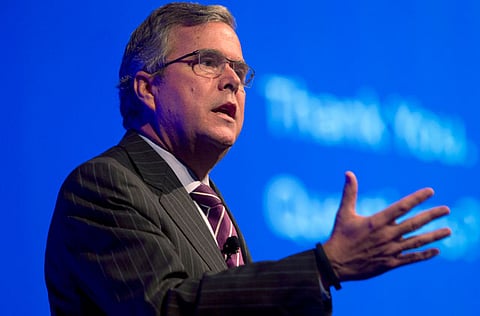Florida Is focus of 2016 Bush Plan
Confidential plan seeks to try to neutralise two potentially grave but homegrown threats

Tallahassee, Florida: The political apparatus surrounding former Gov Jeb Bush, determined to avoid embarrassment in a state that has vexed his party and family in national elections, is plotting a vast operation aimed at turning Florida into a bulwark for his presidential campaign, according to dozens of interviews.
The confidential plan, code-named ‘Homeland Security’, seeks to try to neutralise two potentially grave but homegrown threats to Bush’s long-anticipated run for president: the likely challenge from a charismatic young Republican senator from Miami, Marco Rubio, who is expected to seek the Republican nomination himself, and a demographic drift within Florida that could doom Bush there in a fall campaign against a Democrat.
The Bush effort in Florida, where Barack Obama prevailed in the last two elections, will pour enormous resources and energy over the next year into a state that many thought Bush, its governor from 1999 to 2007, would be able to count on as a bedrock of support.
“Without Florida,” said Bob Martinez, a longtime Bush friend and a former governor of Florida himself, “he knows it would be hard to make the numbers work”.
In what advisers said could amount to a $50 million (Dh183.66 million) undertaking, Bush and his team are rushing to lock up Florida’s best-known political operatives, elected officials and campaign donors — offering them contracts, face time and blandishments, according to those who know of the tactics.
Their forceful message to the state’s top campaign minds: “Keep your schedules clear,” said Dan Dawson, a Republican operative in Jacksonville who specialises in digital strategy and may work with Bush.
Bush’s muscular outreach in Florida — where actions like a tribute to an aide at his deathbed and staff reunions at Disney World have won the admiration of Republican leaders — is relying on a highly personal touch and the tug of loyalty to a man who ushered in what has been a 17-year stretch of Republican state government.
In many ways, friends and advisers said, Bush has been running for president in Florida since the day he left the Statehouse, cultivating a network of former aides and allies through gestures big and small, like birthday emails.
“Jeb has taken the trouble to nurture these relationships,” said John McKager Stipanovich, a prominent Republican lobbyist in Tallahassee who receives a personal message from Bush every November 26. “They don’t even need to reach out in Florida. They never let go.”
With its geographical vastness and tropical flamboyance, colliding nationalities and reputation for electoral mishap, Florida offers the possibility of intrigue in every presidential election. But in 2016, its primary may loom as the most bruising and intimate in the country. Florida is now home to four likely Republican presidential candidates of varying stature and allure: Bush (who lives in Coral Gables); Rubio (West Miami); Ben Carson, a neurosurgeon and author (West Palm Beach); and former Gov Mike Huckabee of Arkansas (Santa Rosa Beach).
For Bush, a native of Texas who made Florida his adopted home in the 1980s, no political terrain is held more dearly — or would be more mortifying to lose to a fellow Republican. But the timing and structure of the state’s primary could make it a sanctuary on the political calendar.
The state last week set a winner-take-all primary on March 15, 2016, the earliest date possible under Republican rules. That means that, after early contests in smaller states where he may struggle and a round of primaries in which delegates will be allocated proportionally, the fight for Florida’s 99 delegates could give Bush a chance to clinch the nomination, pull away from the pack or recover from a stumble.
In a general election, Bush would contend with the painful lessons of his family’s previous campaigns in the state. His father, President George H.W. Bush, barely clung to Florida in 1992 as the nation’s voters turned to a young Democrat, Bill Clinton. Eight years later, his brother George W. Bush was forced into a bitter recount, and then a searing Supreme Court battle, over the outcome in Florida — a campaign that Jeb Bush helped oversee as governor.
Bush has since devoted himself to fortifying the Republican Party across the state, but he has encountered a daunting roadblock: a changing electorate. Even as Republicans control every level of state government, they cannot control the increasing Democratic tinge of important groups of voters, including younger Cuban-Americans and the tens of thousands of people of Puerto Rican descent who have flocked to Orlando and other parts of central Florida in recent years.
Bush’s next steps are clear, advisers said. He must prevent Rubio from building a credible operation in the state; make the case that as a Spanish speaker with a Mexican-born wife, he can overcome demographics that might otherwise favour the Democratic nominee; and, lastly, construct a robust fundraising operation that can collect the tens of millions it would cost Bush to win Florida in a primary and general election.
Behind the scenes, those close to Bush are moving quickly to undermine Rubio. A close Bush ally, David Johnson, has taken over the state’s Republican Party as interim executive director and, in a blunt interview here, sought to discourage Rubio from entering the presidential race.
“I hope that is not going to happen,” Johnson said. “It’s going to cause a lot of problems in the state of Florida.”
He suggested that Rubio remain in the Senate, calling him “a young man that has a lot of potential”.
Sign up for the Daily Briefing
Get the latest news and updates straight to your inbox



